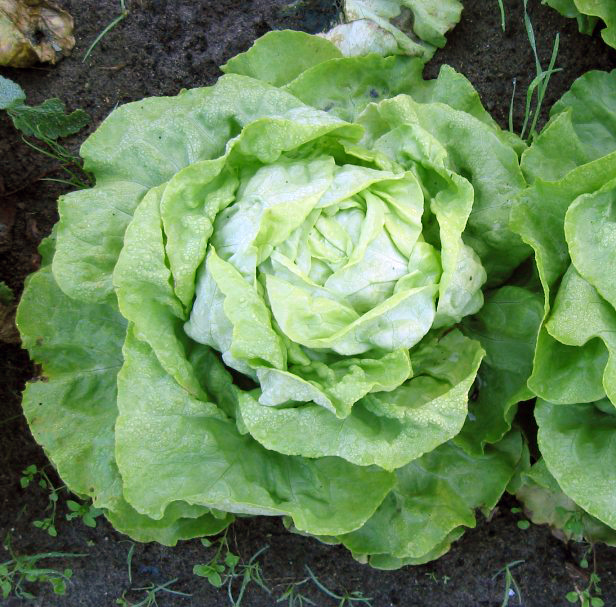Is the Consolidation of the Food Industry Turning Lettuce into a Weapon of Mass Destruction?
 Lettuce head - Wikimedia Commons, CC BY-SA 3.0A consolidated food industry brings you salad and chicken nuggets cheaper—and spreads deadly food-borne pathogens farther.
Lettuce head - Wikimedia Commons, CC BY-SA 3.0A consolidated food industry brings you salad and chicken nuggets cheaper—and spreads deadly food-borne pathogens farther.
In the summer of 2006, consumers across the country began falling sick from a particularly nasty strain of Escherichia coli bacteria, known as 0157:H7. Not all E. coli bacteria are dangerous, but 0157:H7 belongs to the Shiga toxin-producing group of pathogens (known as STEC), which can cause severe, and sometimes fatal, illness. By early October, 199 people in twenty-six states had fallen ill, resulting in 102 hospitalizations and thirty-one cases of kidney failure. Three people died, including a two-year-old boy in Utah.
Government investigators eventually traced the bacteria to fresh spinach harvested from four fields in California’s Monterey and San Benito counties and processed by Natural Selection Foods, one of the nation’s biggest producers of bagged mixed salad. Though a relatively small amount of greens was involved—just one day’s worth of production—the tainted spinach made its way into seven different packing lines and thousands of bags of salad mix processed at one of the company’s two central facilities. Apart from the irony—a quintessential health food causes a deadly national outbreak of illness—the 2006 spinach scare was something of a watershed moment for so-called multistate food outbreaks, which began to pick up in tempo around that time...multistate outbreaks present fresh worries for both consumers and public health officials—because of the speed at which outbreaks can spread nationwide and because of their relative lethality...
This lethality, coupled with the supply-chain efficiencies typical of today’s consolidated food system, is what gives multistate outbreaks such dramatic impact. “A single contamination event on a farm or an industrial-processing facility has the potential to make a lot more people sick than a localized food-handling issue at a birthday or a church supper,” Wise says. Take, for example, a recent multistate outbreak involving imported cucumbers from Mexico and a strain of Salmonella bacteria called Poona. What began as a trickle of cases beginning in late July 2015 soon accelerated into an epidemic. By the end of August, 341 people in thirty states had fallen ill, and two people were dead. Even after two California-based produce companies—Andrew and Williamson Fresh Produce, and Custom Produce Sales—voluntarily recalled their cucumbers in early September, cases continued to pour in. By the end of the outbreak, the tainted cukes had caused 838 reported illnesses in thirty-eight states, including 165 hospitalizations and four deaths...
Breaking up America’s big food trusts—in production, processing, and retail—could indeed help bring back the diversity that America’s food system once had and advocates say is desperately needed, for aesthetic reasons and for public health...
- Tags:
- 0157:H7 (E. coli strain)
- affordability
- American Egg Board
- American Pastured Poultry Producers Association
- Andrew and Williamson Fresh Produce
- Anne Kim
- antibiotic use
- Austin “Jack” DeCoster
- Barack Obama
- Blue Bell
- California
- Cargill
- Centers for Disease Control and Prevention (CDC)
- centralized national food safety regulation
- Chipotle
- Christopher Leonard
- consolidated food industry
- convenience
- cross-contamination
- cross-docking
- Custom Produce Sales
- Department of Agriculture
- Diana Stuart
- Dick Durbin
- DNA fingerprinting of pathogens
- Dole Baby Spinach
- drug-resistant pathogens
- Earthbound Farm
- Escherichia coli bacteria (E. coli)
- Food and Drug Administration (FDA)
- food safety
- Food Safety Modernization Act
- food-borne pathogens
- Foster Farms
- global food production
- Government Accounting Office
- JBS
- Jeremy Sobel
- Kroger
- Laura DeLind
- Mary Hendrickson
- Matthew Wise
- Mike Badger
- modern industrial food processing
- monoculture
- Monterey county
- multistate food outbreaks
- National Chicken Council
- Natural Beef
- Natural Selection Foods
- Nestlé Toll House Cookie Dough
- open agriculture
- Outbreak Response Team
- Peter DeCoster
- Philip Howard
- public health risks
- PulseNet
- Rosa DeLauro
- Safe Food Act of 2015
- salmonella
- Samuel Crowe
- San Benito county
- Shiga toxin-producing group of pathogens (known as STEC)
- Smithfield Foods
- Taco Bell
- Tim York
- Trader Joe’s
- Tyson Foods
- U.S. Department of Agriculture (USDA)
- Veggie Booty
- Western Growers Association (WGA)
- Wright County Egg
- Login to post comments